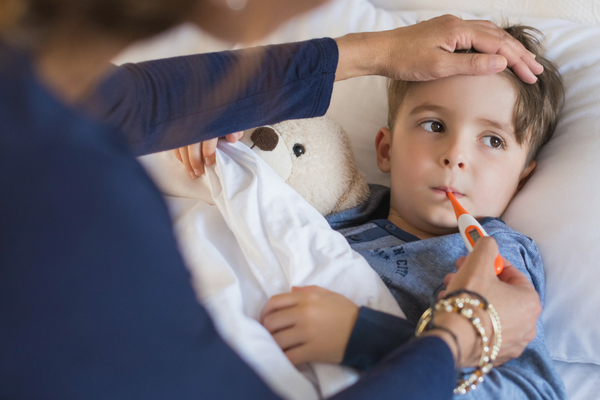It’s one o’clock in the morning and I am the pediatrician on call for my practice. I hear the voice of a nervous first time parent on the phone, “My child has a fever! She has never had a fever before and I am not sure what to do.” As I have done countless times in the middle of the night, I give my “fever talk” and answer all of her question and concerns.
Fever is a symptom, not an illness or disease. It is a sign that your child is ill and the body is trying to fight that illness. As the fever is on the rise or elevated, your child may have chills, and as you give medicine to bring the fever down, your child may start to sweat. Bathing is not necessary and often makes the child more uncomfortable. Do NOT use ice packs or alcohol baths.
How high of a fever is too high? When is it dangerous?
It is not the height of the fever that concerns me, but rather how your child is acting, especially after fever-reducing medications are given. Children who concern me are lethargic, will not perk up for even quiet play at times, and will not drink any fluids. I am much more worried about the child at 101 degrees who looks and acts ill than I am about the child who goes up to 104 degrees, but still plays and drinks. Fever does not cause brain damage. Fever is different than damage from heat stroke or overheating, as happens if a child is left in a hot car.
When do I need to be worried enough to take my child to the emergency room?
- Any baby under 3 months of age with a rectal temperature over 100.4
- Lethargy – This needs to be assessed after fever-reducing medications are given. When children have fevers, their activity level will decline and they will lay around more and sleep more. However, they should be able to perk up at times, especially after fever-reducing medication. If your child will not perk up at times to do some quiet play, that constitutes lethargy.
- Dehydration – not drinking, decreasing urine output, no tears, dry mouth and lethargy
- Labored breathing, skin or lips that look bluish
- Stiff neck
- Febrile seizure
What is the best way to take my child’s temperature?
For babies under three months, we always want a rectal temperature. Options for older kids include temporal artery, tympanic, oral and axilla temperatures and there is truly no one best or most accurate method. Avoid the old fashioned mercury thermometers as mercury can be quite toxic. Since the actual temperature number is less important than how your child is overall acting and feeling, any method is acceptable. It is important to read the directions associated with your thermometer to know how to use it correctly and consistently. We, overall, like the temporal artery method as it is quick and easy to use and comfortable for sick children.
What medications can I give?
The most important treatment is to offer plenty of fluid and make sure your child does not get dehydrated. The main purpose of treating the fever is to make your child more comfortable, since the fever itself is not harmful. If your child is fussy, not eating well or less active, then it is appropriate to give medication. If your child is sleeping comfortably, there is no need to wake him/her up to administer fever-reducing medications. It is also not necessary to withhold medication before the doctor’s appointment so that we may see you child at his/her worst. In fact, we can assess more accurately and hopefully avoid any unnecessary work-up when we can examine your child after medications are given.
- You may give acetaminophen (Tylenol) if you child is over three-months-old. It may be used as needed every 4-6 hours, but not more than five doses in a 24 hour period.
- You may give ibuprofen (such as Advil or Motrin) if your child is over six-months old. It may be used as needed every six hours.
- Do not use aspirin in children as it has been associated with Reye’s Syndrome.
- Both medications should be dosed based on weight. They should bring the fever down some, but not always all the way back to normal.
- Both meds can successfully reduce fevers and either one is an appropriate choice. Ibuprofen lasts a little longer and might be considered before bed. Acetaminophen is easier on the stomach and should be considered if any vomiting is present.
- Be careful in combining these medications in older children if they are taking cold or flu medications that also contain acetaminophen or ibuprofen.
When do I need to bring my child in to the doctor for evaluation?
We are always happy to see your child whenever you have any concerns. Never underestimate your parenting instincts. We also recommend an evaluation at our office for the following symptoms:
- Any concerns with an infection that may need an antibiotic such as an ear infection (ear pulling, fussiness, restless sleep), strep throat (sore throat, swollen glands in the neck and possibly vomiting), pneumonia or bronchitis (deep cough in the chest or any labored breathing), UTI (crying when urinates or foul odor to the urine).
- Influenza-like symptoms (high fever, achy, cold and cough) as Tamiflu is most effective if started within the first 48 hours.
- Fevers without obvious viral symptoms, such as no runny or stuffy nose.
- Fevers that last more than three days.
- Acting ill overall – not active and not eating or drinking well.
Could it be teething?
Teething may cause very mild symptoms only. Temperatures may elevate to 99-100 degrees. Anything higher than 100 degrees is likely something other than teething. Teething and ear infections can both cause similar symptoms. Often the only way to differentiate is with a visit to the doctor’s office for an exam.
Is my child contagious?
For most illnesses, we consider your child contagious until they are fully fever-free, without the aid of medicines, for a full 24 hours. Please do not give your child medicine, see the fever return to normal, and then send him/her off to school or day care. That is unfair to the other children and certainly something you would not want other parents to do, thereby exposing your child to illness. Handwashing is still “hands down” our best means for preventing the spread of illnesses!
A special thank you to today’s guest blogger:: Dr. Lauren A. Peck, MD of Liberty Sharonville Pediatrics

Dr. Peck loves kids and the innocence, honesty and joy they bring to the office each day. She enjoys teaching, and helping guide parents and children through each age and stage of growing up. She appreciates that each patient is a unique individual and takes the time to get to know each child’s strengths, challenges and personality in order to provide the most appropriate advice and treatment.













